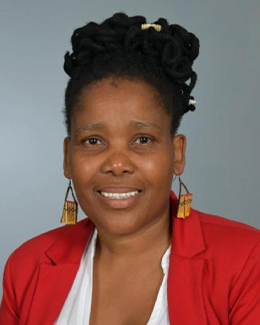

Anthropology and Archaeology are disciplines that are interested in studying people and all aspects of their lives. Anthropology studies living societies and Archaeology studies those in the past.

Dr. Zodwa Radebe
Chair of the Department of
Anthropology and Archaeology
My name is Dr. Zodwa Radebe. As Chair of the Department of Anthropology and Archaeology, it is my great pleasure to welcome you to our department. We are pleased to receive new and returning students, along with colleagues, researchers and others who are interested in our doings. In the department, we are a dedicated team of developing and established Anthropologists, Archaeologists and Museum Curators with a passion to produce critical knowledge on human society in all its variety. We value quality and honest scholarship. Thus, we encourage a true quest for knowledge and a genuine interest in acquiring skills to produce credible knowledge for current and future generations.
Anthropology and archaeology are the core disciplines of the department. Both examine the interplay of cultural, social, economic, political, natural, and environmental factors in the development of humans and human communities. Our disciplines play a critical role in responding to the challenges facing humanity. All our undergraduate and postgraduate offerings are designed to develop an understanding of the interplay between all these factors. The coursework modules we facilitate at undergraduate and honours level train students to critically analyse anthropological and archaeological concepts, develop their own arguments based on their immediate environment and global context, demonstrate advanced writing skills as they convey their arguments, and conduct qualitative research.
We follow a student-centred approach in our teaching so that opportunities are available for students to produce critical thinking skills based on their own interpretations of the information presented to them. At the higher postgraduate levels, which are focused on research, we guide students on how to develop coherent research projects, conduct field research, analyse the data gathered and formulate research products that can be disseminated. We also seek to inculcate a critical thinking approach, and we have co-curricular structures in place to support this.
For just over a decade the anthropologists have sought to deeply engage with how to apply notions around centring Africa and appreciating lessons from decoloniality scholars. We have applied ourselves mindfully to enhance the integrity of anthropology. In our teaching programme we offer the standard set of modules required for building a strong anthropological knowledge base centred on Africanisation and decoloniality, and we have some specialised offerings on the anthropology of disability, tourism, applied anthropology, African ethnography, and African epistemology.
The archaeology programme is designed to showcase South African and African archaeology within a broader global context. We also seek to provide students with exposure to the practical skills required in the field through participation in an annual field school and biennial workshops. A number of our graduates have gone on to pursue careers in heritage and archaeology fields.
Our department also houses the Museum of Anthropology and Archaeology. It is aimed at supporting our two disciplines and our collections are available to both students and the wider public. The museum consists of two components. Our physical museum displays a selection of items from our anthropological and archaeological collections, as well as the Junod collection. There are special exhibitions on the palaeontological work at Bolt’s Farm and the anthropological exhibition on the role of ritual in everyday life. The second component is our forthcoming digital collection which will make available 3D renderings of selected artefacts in our collections.
To enhance a culture of intellectual engagement, the department organises online seminars bi-monthly. Please attend these seminars to learn more about current debates in the field of anthropology and archaeology. Please contact Ms Hlope at hlopetc@unisa.ac.za to add your name to the distribution list.
We look forward to another successful and enriching academic year!